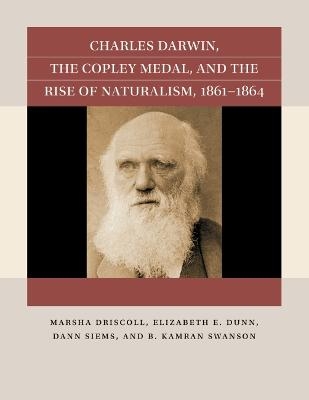
Charles Darwin, the Copley Medal, and the Rise of Naturalism, 1861-1864
Seiten
2022
The University of North Carolina Press (Verlag)
978-1-4696-7077-5 (ISBN)
The University of North Carolina Press (Verlag)
978-1-4696-7077-5 (ISBN)
Since its appearance in 1859, Darwin’s long-awaited treatise in ""genetic biology"" had received reviews both favorable and damning. Thomas Huxley and Samuel Wilberforce presented arguments for and against the theory in a dramatic face-off at the 1860 meeting of the British Association for the Advancement of Science in Oxford.
Since its appearance in 1859, Darwin's long-awaited treatise in "genetic biology" had received reviews both favorable and damning. Thomas Huxley and Samuel Wilberforce presented arguments for and against the theory in a dramatic and widely publicized face-off at the 1860 meeting of the British Association for the Advancement of Science in Oxford. Their encounter sparked a vigorous, complex debate that touched on a host of issues and set the stage for the Royal Society's consideration of whether they ought to award Darwin the Copley Medal, the society's most prestigious prize. While the action takes place in meetings of the Royal Society, Great Britain's most important scientific body, a parallel and influential public argument smolders over the nature of science and its relationship to modern life in an industrial society.
A significant component of the Darwin game is the tension between natural and teleological views of the world, manifested especially in reconsideration of the design argument, commonly known through William Paley's Natural Theology; or, Evidences of the Existence and Attributes of the Deity(1802) and updated by Wilberforce. But the scientific debate also percolated through a host of related issues: the meaning and purposes of inductive and hypothetical speculation in science; the professionalization of science; the implications of Darwinism for social reform, racial theories, and women's rights; and the evolving concept of causation in sciences and its implications for public policy. Because of the revolutionary potential of Darwin's ideas, the connections between science and nearly every other aspect of culture became increasingly evident. Scientific papers and laboratory demonstrations presented in Royal Society meetings during the game provide the backdrop for momentous conflict, conflict that continues to shape our perceptions of modern science.
Since its appearance in 1859, Darwin's long-awaited treatise in "genetic biology" had received reviews both favorable and damning. Thomas Huxley and Samuel Wilberforce presented arguments for and against the theory in a dramatic and widely publicized face-off at the 1860 meeting of the British Association for the Advancement of Science in Oxford. Their encounter sparked a vigorous, complex debate that touched on a host of issues and set the stage for the Royal Society's consideration of whether they ought to award Darwin the Copley Medal, the society's most prestigious prize. While the action takes place in meetings of the Royal Society, Great Britain's most important scientific body, a parallel and influential public argument smolders over the nature of science and its relationship to modern life in an industrial society.
A significant component of the Darwin game is the tension between natural and teleological views of the world, manifested especially in reconsideration of the design argument, commonly known through William Paley's Natural Theology; or, Evidences of the Existence and Attributes of the Deity(1802) and updated by Wilberforce. But the scientific debate also percolated through a host of related issues: the meaning and purposes of inductive and hypothetical speculation in science; the professionalization of science; the implications of Darwinism for social reform, racial theories, and women's rights; and the evolving concept of causation in sciences and its implications for public policy. Because of the revolutionary potential of Darwin's ideas, the connections between science and nearly every other aspect of culture became increasingly evident. Scientific papers and laboratory demonstrations presented in Royal Society meetings during the game provide the backdrop for momentous conflict, conflict that continues to shape our perceptions of modern science.
Marsha Driscoll is professor emerita of psychology at Bemidji State University. Elizabeth E. Dunn is professor of history at Indiana University South Bend. Dann Siems was assistant professor of biology at Bemidji State University. B. Kamran Swanson is assistant professor of philosophy at Harold Washington College.
| Erscheinungsdatum | 07.07.2022 |
|---|---|
| Reihe/Serie | Reacting to the Past |
| Zusatzinfo | 5 halftones, 2 tables |
| Verlagsort | Chapel Hill |
| Sprache | englisch |
| Maße | 216 x 279 mm |
| Gewicht | 199 g |
| Themenwelt | Sachbuch/Ratgeber ► Natur / Technik ► Natur / Ökologie |
| Naturwissenschaften | |
| ISBN-10 | 1-4696-7077-1 / 1469670771 |
| ISBN-13 | 978-1-4696-7077-5 / 9781469670775 |
| Zustand | Neuware |
| Informationen gemäß Produktsicherheitsverordnung (GPSR) | |
| Haben Sie eine Frage zum Produkt? |
Mehr entdecken
aus dem Bereich
aus dem Bereich
Familien und Gattungen einheimischer Pflanzen
Buch | Hardcover (2022)
Haupt Verlag
64,00 €
Allergien bei Hunden verstehen und behandeln
Buch | Softcover (2023)
Minerva Verlag
16,90 €


